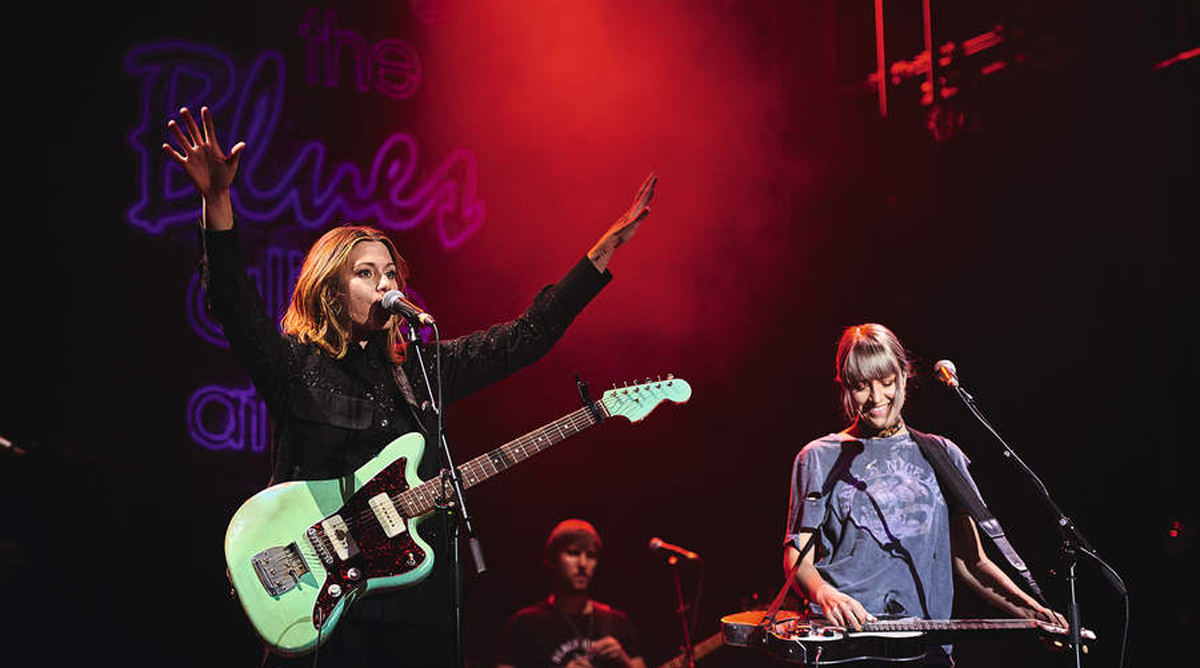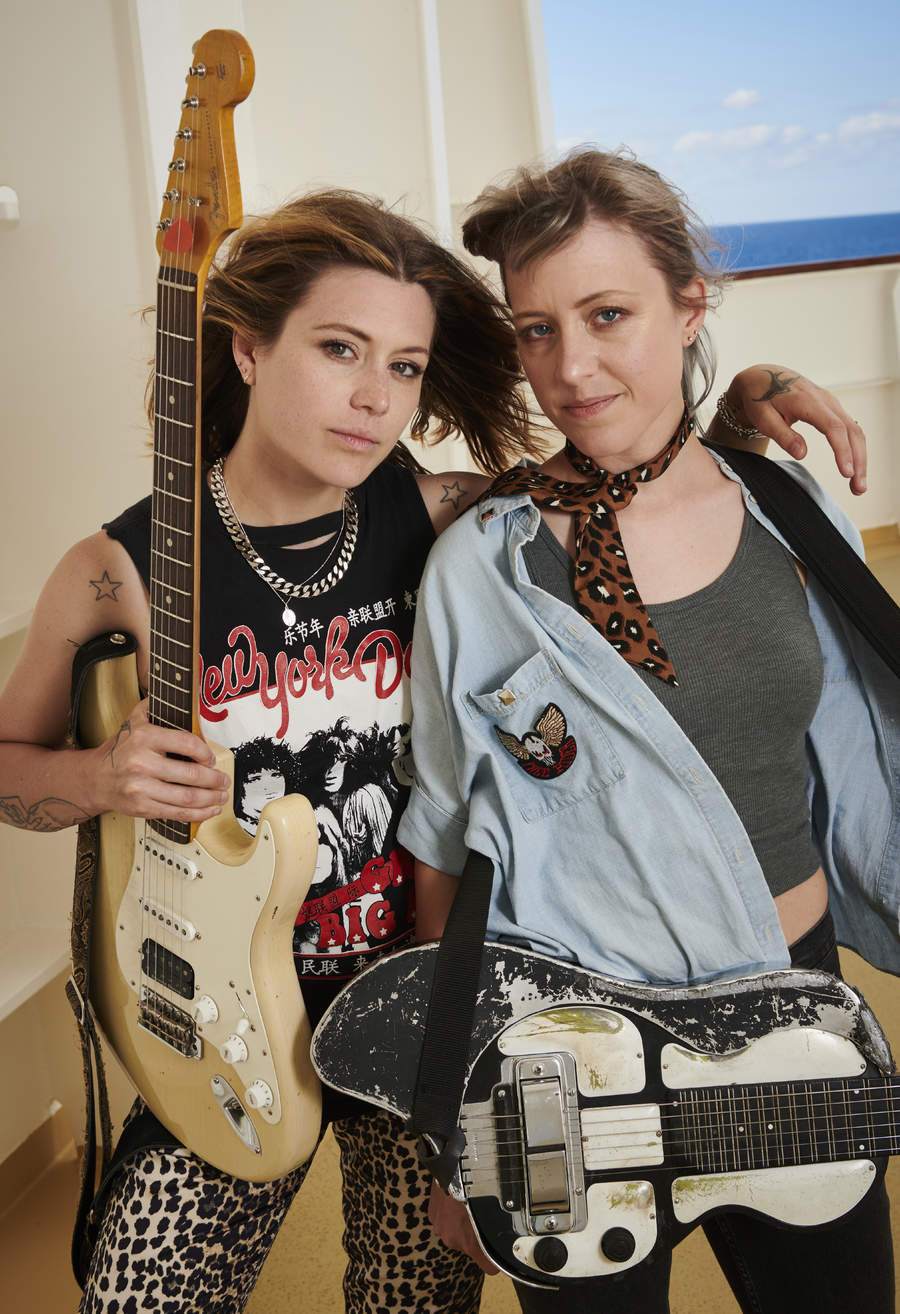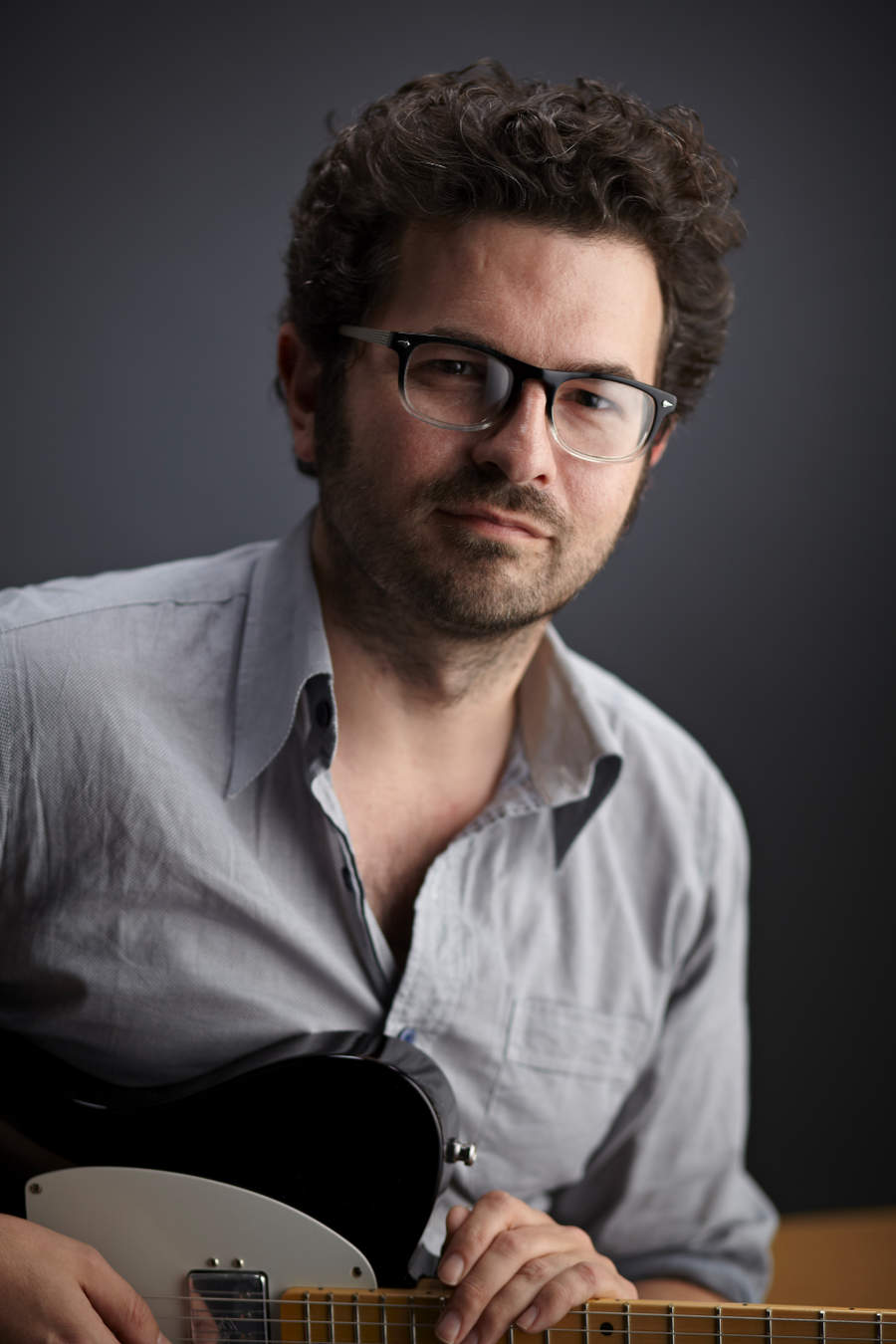Larkin Poe interview: Megan and Rebecca Lovell on the endless possibilities of slide guitar and playing 21st-century blues
The Lovell sisters have distilled their own brand of musical moonshine from the tangled roots of American blues

The roots of Americana extend to some unexpected places. We’re somewhere in the Mediterranean, reporting on the Keeping The Blues Alive cruise for Guitarist. Sisters Megan and Rebecca Lovell, better known as Larkin Poe, are one of the stellar acts aboard and they’re gamely posing for photos as the sea breeze gusts so hard over the rail that it nearly knocks our photographer’s light stand over.
Larkin Poe are something of a breath of fresh air themselves. Their sound is as raw as gasoline but tempered by dulcet vocal harmonies and a sure melodic instinct. As sisters inspired by bluegrass and country-blues guitar, they follow in the grand American tradition of pioneers such as Maybelle and Sara Carter – though theirs is a decidedly heavier sound, as well it might be 90 years on.
The family bond, though, is just as relevant to their sound as it was to the Carters.
“We’re very close and from the ground up, we’ve really done everything together,” Megan, who plays lap-steel slide, reflects. “We started touring when she was 15 and I was 16. Really, we’ve shared everything, so there is a lot of that twin-like communication. I can just look at her and know what she’s thinking and especially on stage. It works so well, because she can shoot me a little sideways look and I know what she’s thinking.”
Rebecca, who is the Fender-wielding half of the duo, agrees: “We are intensely close and at times we feel sort of like we’ve been cloven from the same soul, but we’re very different people and we have very different strengths.
"Learning how to allow my weaknesses to be covered by her strengths, and vice versa, has made us a lot more of a lean, mean killing machine. At least we try on stage to lay waste.”
Once you get past that awkward stage, you’ll find that it’s just so amazing because it’s such a vocal instrument. I love the endless possibilities of the slide
Megan Lovell
There’s certainly a kind of yin and yang going on in their sound. Megan’s lap-steel work is one side of it. Like all good slide guitar, it has a vocal quality – adding a third voice to the sisters’ harmonies, then breaking free every time a solo comes around.
Get the MusicRadar Newsletter
Want all the hottest music and gear news, reviews, deals, features and more, direct to your inbox? Sign up here.
Though, actually, the term lap-steel is misleading in this case as it doesn’t seem to spend a lot of time on her lap, being slung low from her neck like a regular electric guitar.
Why did she opt for the lap steel, rather than just play slide on a conventional electric?
“We started out classically trained,” Megan recalls. “When we were three and four years old, we picked up classical violin and piano. Then when we were in our teens, we went to a bluegrass festival and were bitten by the roots music bug, so we quit our classical lessons and picked up banjos and guitars. I picked up the Dobro and was really blown away by seeing it being played."
“We grew up listening to a lot of Alison Krauss and Jerry Douglas, who I fell in love with really early. Not knowing what that sound was until I saw it being played and, for me, wanting to be able to plug in, it just made sense for me to go from the Dobro to the lap steel. I always thought, ‘I’ll never play the lap steel. The Dobro is where my heart is.’ It turns out, the lap steel is where my heart is.
"I think it’s such a versatile instrument. You hear something like David Lindley playing on Running On Empty… most people don’t really realise that they’ve heard a lap steel on that. One of the most iconic solos that they’ll hear is a lap steel.”
Because slide is one of those disciplines that so many guitarists dabble in, only to give up in disgust when they can’t coax sweet sounds from the instrument, we ask Megan what her advice is those who are beginners on slide.
“Push through the awkward phase, because it is a very awkward feeling thing to do at first,” she says. “Especially on the lap steel with the [overhand-style tone] bar. I think that once you get past that awkward stage, you’ll find that it’s just so amazing because it’s such a vocal instrument. I love the endless possibilities of the slide.”

Rebecca, meanwhile, is the prime mover of the duo’s sound. Hers are the jagged-edged riffs that grab listeners by the lapels, and she’s also the vocal lead on much of the duo’s work.
“I mainly play a Stratocaster now,” she says of her live rig. “Originally, I started off playing a Jazzmaster because Elvis Costello plays a Jazzmaster and that, to me, was always the quintessential silhouette for a guitar. I’ve transitioned into Strats mostly because I’m a fairly short person and it helps to have less surface area on the guitar that I can bang my upper thighs against, which is cool. I can run around a lot better now that I’m not playing a Jazzmaster,” she adds.
I think that it’s our responsibility as artists to bring something new, to try our best to break the mould a little bit. That’s what I think will keep a genre alive – if you continue to allow it to be pioneered
Megan Lovell
Hipsters take note: offsets and stage athletics can be a bruising combo… “I’ve swapped out the traditional Strat bridge pickup for a humbucker, which has been cool,” she continues. “Since we’re a four-piece it helps beef it up. I’m a meat-and-potatoes guitar player. I write a lot of the songs for the band, so I’ll write little riffs and things, but I’m still a work in progress on souping up my stylings.”
Despite their contrasting styles on guitar, the cores of the sisters’ rigs are very similar, which may explain how they get such a cohesive sound.
“We actually both use a similar effects pedal for overdrive,” Rebecca explains. “It’s the TB Drive, which is made by Rodenberg. It’s a really versatile pedal. It’s essentially like two Tube Screamers stacked back to back, so you can have varying gain structures that will give you more screamy tones or a more traditional overdrive. That’s all, outside of a couple of echo pedals on the ’boards,” she says.
“There’s echo, a little ’verb,” Megan adds. “I use an Ernie Ball volume pedal. We both play through Fender Deluxes.”
The sisters’ music is steeped in blues but deftly sidesteps the stale clichés of the genre. Blues guitar is a crowded room these days, so that’s quite a tall order. It helps that the duo places an emphasis on serving the songs, rather than making songs empty vehicles for solos, but part of their immediacy and impact also comes from a willingness to move the conversation forward.
You don’t learn how to ride a bike without falling off a lot and I think that the same can be said about music
Rebecca Lovell
“We’re a blues band in the 21st century and female-fronted,” Megan says. “We have a lot of angles that make us different. I think that it’s our responsibility as artists to bring something new, to try our best to break the mould a little bit. Even if that means playing with programming, going into the studio and introducing some hip-hop tricks with [Roland TR-] 808 hi-hat patterns or playing with subject content lyrically that may push some boundaries.
"That’s what I think will keep a genre alive – if you continue to allow it to be pioneered, while not forgetting the past, because historically blues is one of the most storied and complex genres that you could ever imagine.”
Evolving the sound of a well-established musical form like blues requires a certain amount of boldness as every genre has its purists who resist change. Certainly the bluegrass scene that Rebecca and Megan first got into as teenagers, before heading towards blues, has its share of ironclad traditionalists.
“I respect that,” Rebecca reflects. “And I think everyone’s got their place in the world. Purists exist in every genre, specifically in more of the ‘source music’ of the South – bluegrass and the blues – that you run across people who feel compelled to protect and to preserve. Sometimes time capsules are helpful to be able to stay true and have certain bands that that’s their mission, and I respect that.
"Also, I think accepting the fact that that’s not necessarily what we’re going to bring to the genre or what we’re going to try and create for our fans. Growth is always awkward. It is, you know? You don’t learn how to ride a bike without falling off a lot and I think that the same can be said about music,” she concludes.
We also appreciate our very loyal fanbase who has seen us go through many changes and genres,” Megan adds. “They stuck with us and said, ‘Do what you’ve got to do, we’re here for you.’”
- Larkin Poe's Venom & Faith is available now on Tricki-Woo Records. Order it here
Jamie Dickson is Editor-in-Chief of Guitarist magazine, Britain's best-selling and longest-running monthly for guitar players. He started his career at the Daily Telegraph in London, where his first assignment was interviewing blue-eyed soul legend Robert Palmer, going on to become a full-time author on music, writing for benchmark references such as 1001 Albums You Must Hear Before You Die and Dorling Kindersley's How To Play Guitar Step By Step. He joined Guitarist in 2011 and since then it has been his privilege to interview everyone from B.B. King to St. Vincent for Guitarist's readers, while sharing insights into scores of historic guitars, from Rory Gallagher's '61 Strat to the first Martin D-28 ever made.
“Every note counts and fits perfectly”: Kirk Hammett names his best Metallica solo – and no, it’s not One or Master Of Puppets
“I can write anything... Just tell me what you want. You want death metal in C? Okay, here it is. A little country and western? Reggae, blues, whatever”: Yngwie Malmsteen on classical epiphanies, modern art and why he embraces the cliff edge












